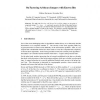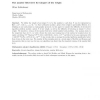39 search results - page 2 / 8 » A note on the distribution of the number of prime factors of... |
GI
2007
Springer
13 years 11 months ago
2007
Springer
: We study the factoring with known bits problem, where we are given a composite integer N = p1p2 . . . pr and oracle access to the bits of the prime factors pi, i = 1, . . . , r. ...
EUROCRYPT
1999
Springer
13 years 10 months ago
1999
Springer
Abstract. We present the first efficient statistical zero-knowledge protocols to prove statements such as: – A committed number is a prime. – A committed (or revealed) number ...
MOC
2010
13 years 12 days ago
2010
We define the weight of an integer N to be the smallest w such that N can be represented as w i=1 i2ci , with 1,..., w{1,-1}. Since arithmetic modulo a prime of low weight is parti...
ANTS
1998
Springer
13 years 10 months ago
1998
Springer
In this note we address the question whether for a given prime number p, the zeta-function of a number field always determines the p-part of its class number. The answer is known t...
ACNS
2007
Springer
13 years 11 months ago
2007
Springer
In the RSA system, balanced modulus N denotes a product of two large prime numbers p and q, where q < p < 2q. Since IntegerFactorization is difficult, p and q are simply esti...


